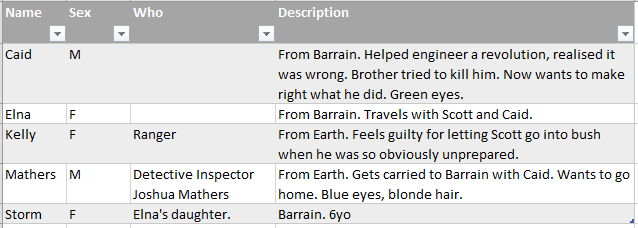I have been reading Anne Mini’s Author! Author! blog a lot lately. Anne has some useful, practical advice on writing. She has a number of articles on self editing, which I particularly enjoy.
It’s funny though, how someone else can point out the obvious far better than you can read it in your own work.
In The Screen Goes Wavy she writes about factual redundancy. The old, “As you know, John, my father died 20 years ago in unusual circumstances.”
Mini gives an example that starts with:
Marcus Aurelius paced the room, frowning, revisiting in his mind his last encounter with Cardinal Richelieu, two months before, when they had shot those rapids together in the yet-to-be-discovered territory of Colorado. Despite moments of undeniable passion, they had not parted friends. The powerful holy man was known for his cruelty, but surely, this time, he would not hold a grudge.
…
Richelieu laughed brutally, but with an undertone of affection. “Tobacco had not come to Europe in your time.” He shook two out of the pack and stuck both into his mouth. “And barely in mine.”
He lit the pair and handed both to his erstwhile lover …
The Screen Goes Wavy, Anne Mini
Fairly obviously, from the example, the relationship between these two men is important. Yet in the rewrite, she cuts most of it out.
Marcus Aurelius paced the room, frowning. The powerful holy man before him was known for his cruelty, but surely, he could not still be holding a grudge about how they’d parted in Colorado. “Please tell me, Armand. For old times’ sake.”
Richelieu laughed brutally, but with an undertone of affection. …
The Screen Goes Wavy, Anne Mini
Why does she do this?
As she says, if the Colorado episode is important to the story to make a difference here, then you, as the author, should have told the story in its entirety when it happened. What happened in Colorado changes how Marcus and Richelieu view each other, and makes Marcus believe that Richelieu will treat him differently.
The reader needs to know about it when it happened. You can’t bring things in out of the blue like this. If you wrote the scene well enough the reader will remember it when they get to this one, and you don’t need all the unnecessary flashback. It makes for much cleaner writing.
If the incident wasn’t important enough to have its own scene, then it shouldn’t be included at all.
Mini says that you can eliminate most of these flashbacks by a well-placed scene (or scenes) earlier in the novel.
It’s obvious when you see it illustrated the way she has done in her article, but sometimes we forget. I’m going back to read Shared Memories now, to see if I can get rid of a couple of flashbacks.


